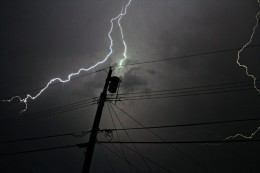
To protect data as well as equipment in a power outage, you might also want to buy a UPS (uninterruptible power supply) for your home computer.
Power outages can occur anywhere, although they occur more often in the Northeast and Midwest during the winter due to damage to power lines, and in urban areas during the summer due to air conditioner use and our aging electrical grid. What can you do to prepare your home and family for a possible power outage?
Your most important job is to ensure your family’s safety. To do so, you will need:
- At least one non-electrical telephone. Wireless and cordless models require electricity. In a power outage, cell phone services might also be busy — having at least one non-electrical unit you can plug directly into a jack will give you access to phone service. Emergency lines are likely to be jammed — to check the status of a power outage, contact your utility company directly.
- A battery-powered radio and extra batteries, to hear newscasts and emergency reports.
- An up-to-date evacuation plan. Pay particular attention to the needs of any disabled, ill or elderly family members — they might be particularly vulnerable to the effects of weather and need to be evacuated to a different location.
- Flashlights and spare batteries in a place easy to find in the dark — preferably, one in every bedroom and major living space.
- Coolers and ice packs. Certain medications require refrigeration. Keep a cooler on hand, with some ice packs at the ready in your freezer, to keep them cool in the event of an extended power outage. During warm-weather outages, ice packs can also help keep family pets comfortable when the air conditioning goes out. Dogs, cats, rabbits and many other animals lack the ability to perspire and are sensitive to heat.
To prevent spoilage of foods stored in your refrigerator and freezer, avoid opening the doors during a power outage. Frozen goods can remain unspoiled for up to 24 hours in a half-full freezer and for approximately 48 hours in a full freezer. - Surge protectors to protect electronics. You might also want to buy a UPS (uninterruptible power supply) for your home computer. This device allows you to protect data as well as equipment in a power outage. A UPS has a battery that provides power to a computer or other electronic device for a short period of time after an outage so that you can save your data and turn off the equipment properly. Some UPSs have a serial cable, which can tell the computer to shut itself off if power fails. This type of UPS provides the best type of protection for computers that are left on unattended for long periods of time.
Insurance considerations
Most homeowners policies, except for the most basic, cover “sudden and accidental damage from artificially generated electrical current.” This coverage would apply to your home’s electrical service equipment, not to electronic components. If you have freezers full of food, your homeowners policy will cover you for spoilage due to a power outage.

Leave a Reply